Potentially Unwanted Application: OneStart
OneStart is one of those annoying programs that gets installed without you really wanting it. You download some free software, click through the installer too fast and suddenly your browser has a new homepage and you're seeing extra ads everywhereIt is not exactly malware but it is definitely unwanted
In this post, I have done the analysis for OneStart samples thoroughly. I decided to analyze 2 versions of OneStart. OneStart Analysis both older and latest samples
Older sample: OneStartInstaller-v1.3.141.0.msi (SHA256:152c23d1e4411e9c1cf17cad5e2b14a07b6e561f58355f1f9490cb82ae96b52c)
Latest sample: OneStartInstaller-v5.5.249.0.msi (SHA256:c571c75b1878c02f801ef1e953176c1e7db1ca2c9809811637a44e5a98d228cd)
I did the reverse of the .msi by doing the static analysis first and then proceeded with dynamic analysis.
Older sample: OneStartInstaller-v1.3.141.0.msi (SHA256:152c23d1e4411e9c1cf17cad5e2b14a07b6e561f58355f1f9490cb82ae96b52c)
Let’s start with the static analysis first. For msi, we can use a tool called msidump and we can see the attributes of the msi. On the customAction, I noticed that it would run PowerShell script embedded in the msi. So, what does it do?
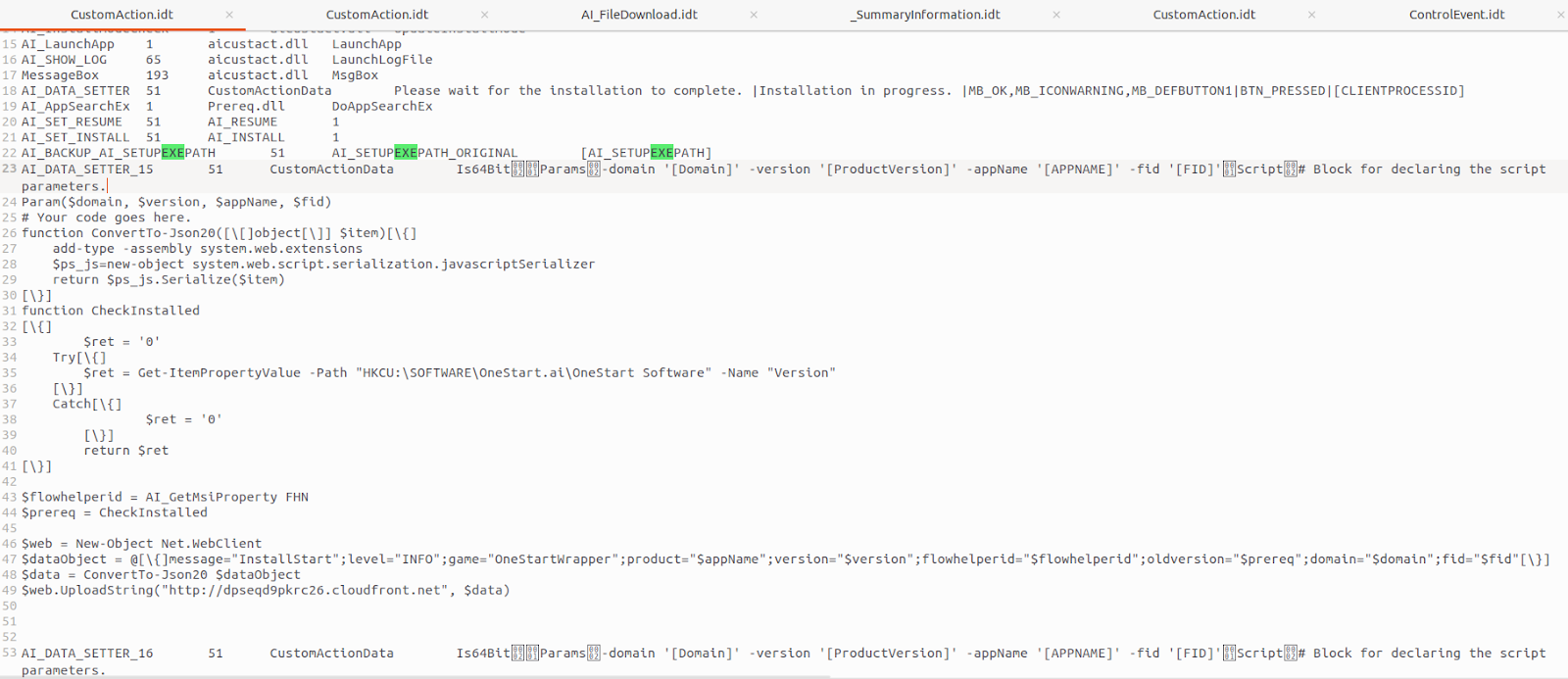
It ConvertTo-Json20:
function ConvertTo-Json20([object] $item) {
add-type -assembly system.web.extensions
$ps_js = new-object system.web.script.serialization.javascriptSerializer
return $ps_js.Serialize($item)
}Then, it checks if the software has been previously installed by querying the registry. function CheckInstalled {
$ret = '0'
Try {
$ret = Get-ItemPropertyValue -Path "HKCU:\SOFTWARE\OneStart.ai\OneStart Software" -Name "Version"
} Catch {
$ret = '0'
}
return $ret
}Then, this is the most interesting, it gets installation parameters such as $domain, $version, $appName, $fid and Calls CheckInstalled to get the old installed version. It then Uploads the following data to suspicious URL, hxxps[:]//dpseqd9pkrc26[.]cloudfront[.]net/:
{
"message": "InstallStart",
"level": "INFO",
"game": "OneStartWrapper",
"product": "[APPNAME]",
"version": "[ProductVersion]",
"flowhelperid": "[FlowHelperID]",
"oldversion": "[PreviousInstalledVersion]",
"domain": "[Domain]",
"fid": "[FID]"
}It retrieves installation-related data from multiple JSON files in:
- $env:APPDATA/BBWC/.data/wc.json
- $env:APPDATA/Browser Extension/SafeBrowsingExtension/.data/be.json
- $env:APPDATA/Browser Assistant/.data/browser-assistant.json
- $env:LOCALAPPDATA/OneStart.ai/OneStart/.data/OneStart.json And then upload it to the URL mentioned.
Without doing dynamic analysis, this is blatantly shown the unwanted behaviors of the app. Why?
This PowerShell script collects user/system information without clear consent. It raises privacy concerns. It checks for and interacts with multiple system locations, could be to ensure the app remains installed or reinstalled. Also, it reads files from APPDATA and LOCALAPPDATA, potentially related to browser extensions and other software components and modifies installation behavior based on existing data.
Hence, I did not proceed to do dynamic analysis for this older version of OneStart as it should remain as PUA.
IOCs Files 805dba596d906912f516e34ddfdcc980abaf36a9 1701a32a53a4111f0ce627ccb440fb9435cc8ff2 5d534563fbff750637f36ef6bd6e981c20261e7e
URL http[:]//dpseqd9pkrc26[.]cloudfront[.]net
Latest sample: OneStartInstaller-v5.5.249.0.msi (SHA256:c571c75b1878c02f801ef1e953176c1e7db1ca2c9809811637a44e5a98d228cd)
For the latest sample, the CustomAction looks clean. No PowerShell embedded.
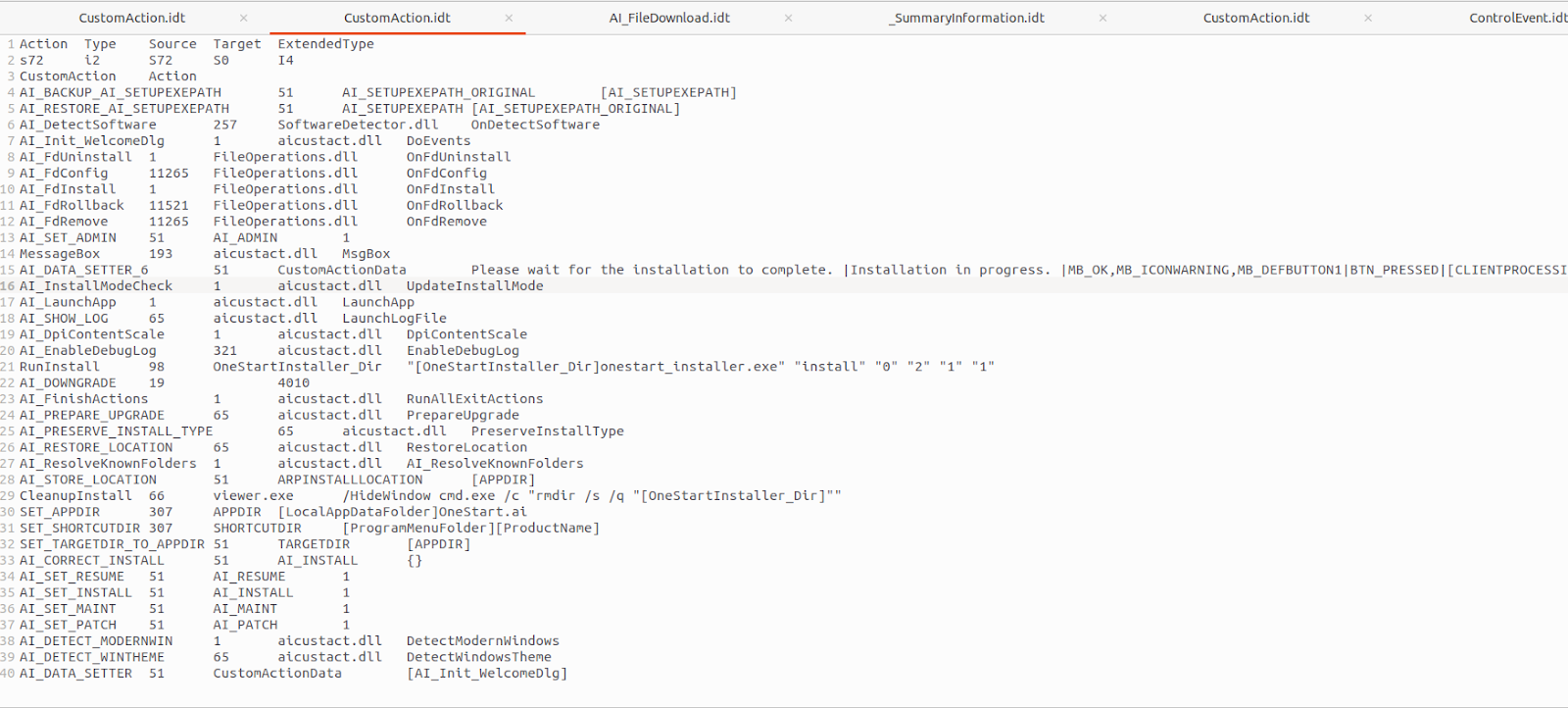
Then I checked the FileDownload and it gave me the idea that this installer might be downloading additional .exe file.

But until now, there have not been any suspicious things found. Then I proceed with dynamic analysis.
Alright for this dynamic analysis, I executed the .msi installer and observed that the installation menu does not allow users to select a custom installation path. Upon clicking “Accept and Install,” the installation process starts immediately.
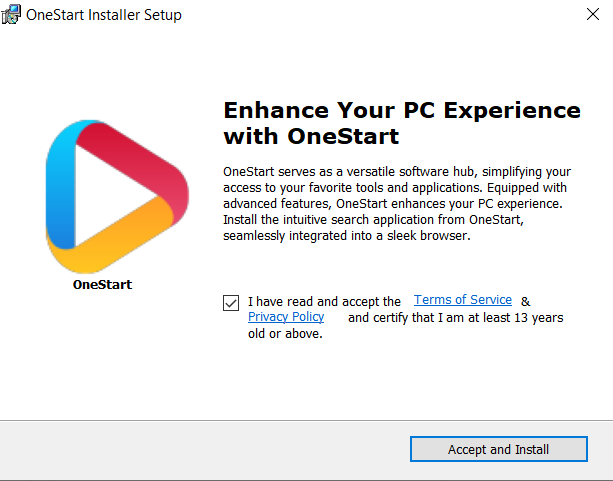
The installer downloads the actual application file (103MB, SHA-1: a954ae672e11132d93269e741c3f65ca97bfb44d) from an HTTP source and stores it in: C:\Users<name>\AppData\Local\OneStart.ai\OneStart Installer. Then, it will run the CMD:
PROCESS: cmd.exe [8348]
FILE: C:\Windows\SysWOW64\cmd.exe
CMDLINE: "C:\Windows\System32\cmd.exe" /c "rmdir /s /q "C:\Users\training\AppData\Local\OneStart.ai\OneStart Installer\""PROCESS: cmd.exe [4396]
FILE: C:\Windows\System32\cmd.exe
CMDLINE: C:\Windows\System32\cmd.exe /c ""%LOCALAPPDATA%\OneStart.ai\OneStart\Application\onestart.exe" --update"This script appears to be a clean-up operation after installation, but it provides insight into the application’s installation directory.
Next, when I run Autoruns I can see it does create persistence in registry
"HKCU\SOFTWARE\Microsoft\Windows\CurrentVersion\Run" /v "OneStartChromium" /f"And
"HKCU\SOFTWARE\Microsoft\Windows\CurrentVersion\Run" /v "OneStartBar" /f"(Persistence does not automatically mean it is malicious. Many legitimate programs set up persistence for various reasons.)
But then something catches my eye. OneStart also creates a scheduled task that ensures the browser launches automatically upon system startup, even if disabled in Task Manager. This behavior could be intrusive for regular users who may not know how to stop it.
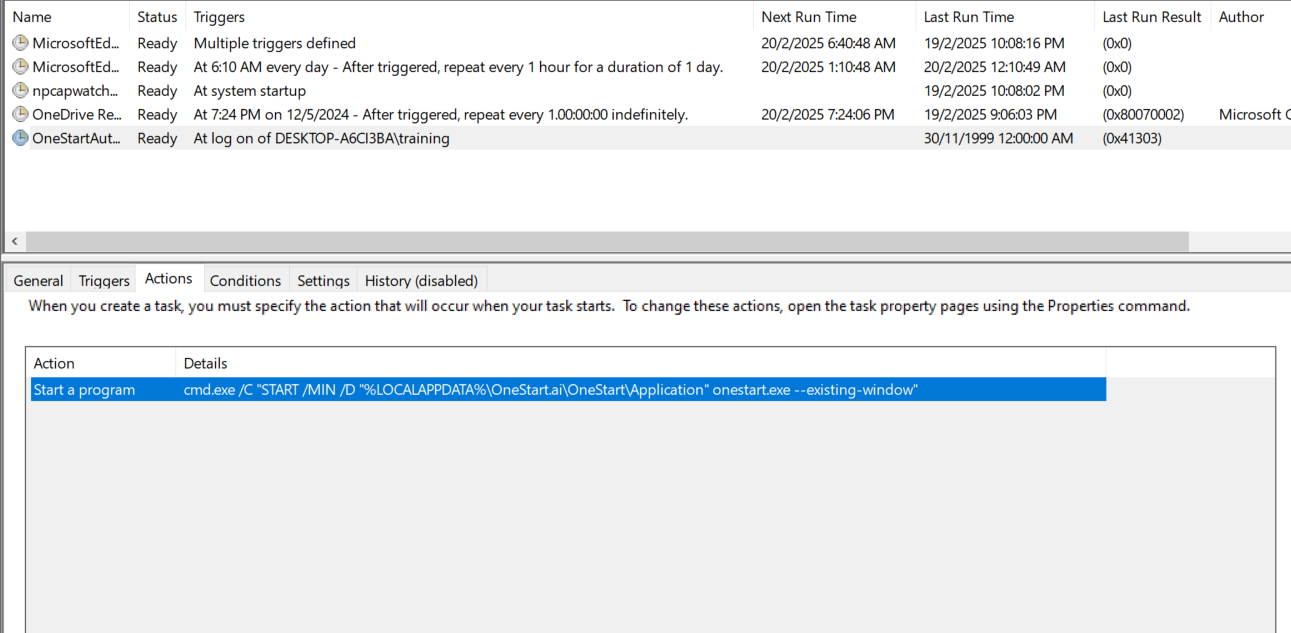
To confirm this, I rebooted my VM, and OneStart Browser launched automatically despite being disabled in Task Manager. So this is kinda irritating
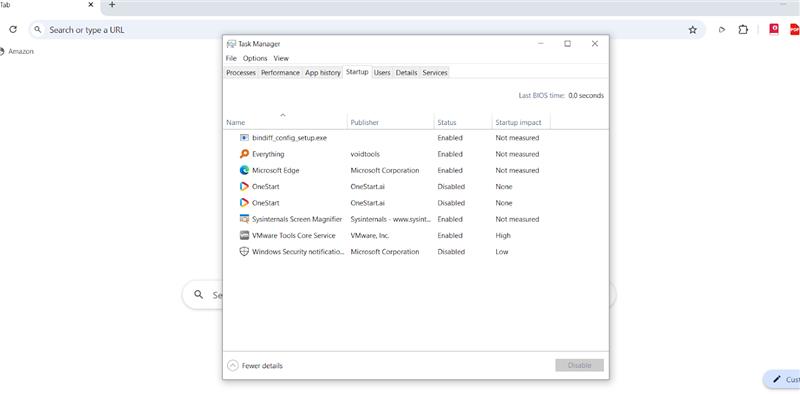
Next, I tried to browse anything on the browser and check the connection using Fiddler. The browser uses Yahoo.com as its default search engine. However, looking at the screenshot below, before it redirects users to Yahoo, all search queries are first sent to onestart.ai without user consent. Then, it will redirect you to yahoo.com (malaysia.search.yahoo.com as in the screenshot). This is not right as the app sends search data to onestart.ai with neither disclosure nor consent from the user. It raises privacy concerns.

Then, I noticed it has a pre-default extension installed on the browser. It is called “OneStart Extension”. This extension is forcibly installed during the installation and it cannot be disabled. Another thing that raises the concern of users’ privacy. It can be used to inject advertisements, modify browser settings and track user activity.
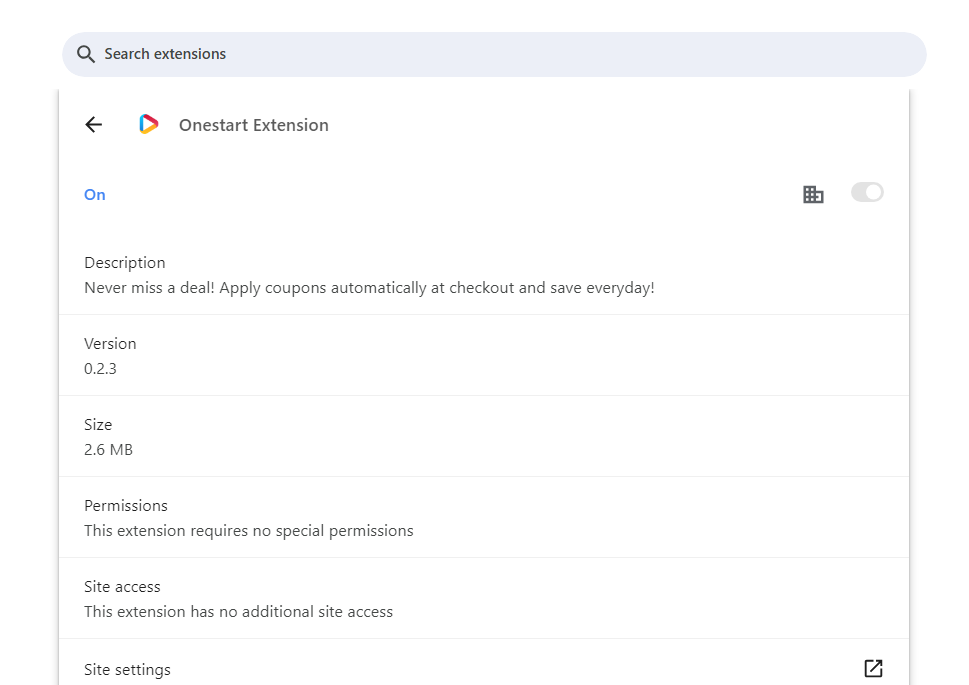
Upon further investigation using Regshot, I examined registry changes before and after installation. Interestingly, the extension registry contains three different entries, but only one is visible in the browser OneStart Extension (in the registry, the name/id is npmibi……). The other 2 extensions are not available at https://chrome.google.com/webstore/detail/EXTENSION_ID. Are the other 2 extensions installed silently?
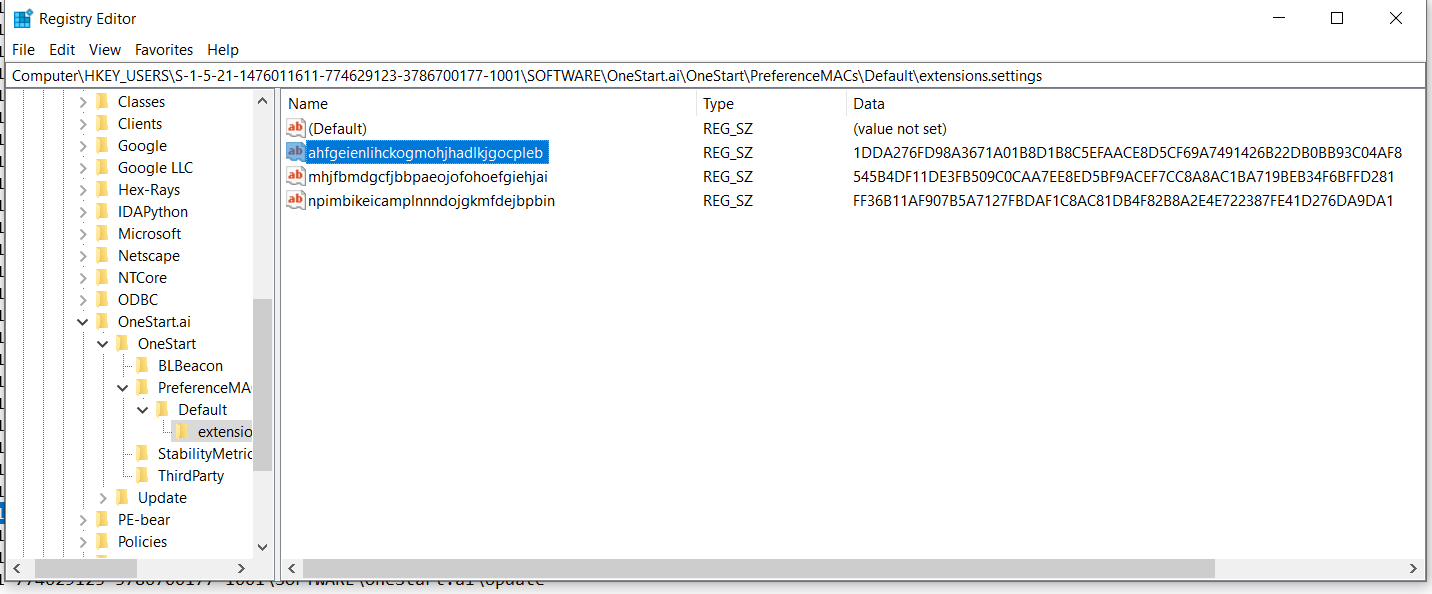
So yes, based on the analysis on both samples (older and latest version of OneStart), I believe we should remain both samples and for sure other older versions of OneStart as PUA.
IOCs Files 78afb665d6066394b2f824bbe469b2e8f14107fc a193a5df2be0f7bdcd19c73638117625f35e3499 a954ae672e11132d93269e741c3f65ca97bfb44d 21da3bc91ca604fbcfa60f3d65fe82812953ca9e
URLs/Domains onestart.ai
Note: Potentially-Unwanted Application/Potentially-Unwanted Program (PUA/PUP) is not a virus or malicious app. It does not reach the threshold yet to become malicious. However, PUA could be a program that could annoy users, doing something without consent and could be dangerous if utilized wrongly.